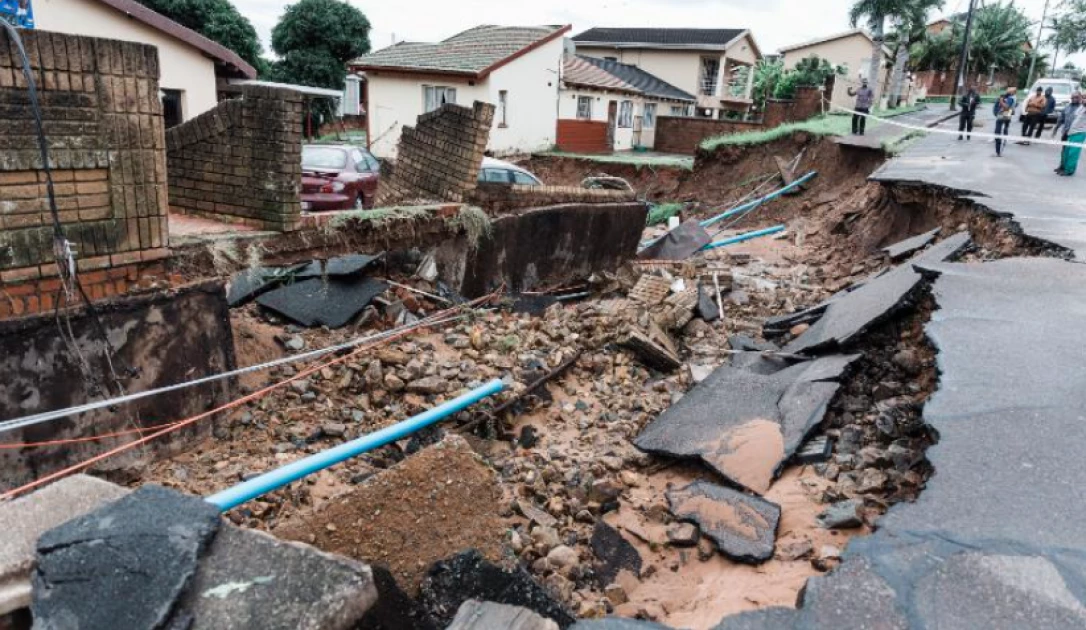Death toll jumps to 259 after flooding washed away roads, destroyed homes in South Africa

Heavy rains and flooding battered the eastern coast of
South Africa on Wednesday, killing at least 259 people, damaging roads and
destroying homes.
The
tragedy marked "one of the darkest moments in the history" of the
KwaZulu-Natal province, the regional government said in a tweet.
"We
join the families in mourning the lives that we have lost as a result of the
heavy rains," the government wrote. "We wish to commend disaster
management teams for the tireless work they have been doing to evacuate
affected communities."
The flooding hit KwaZulu-Natal, which includes the coastal
city of Durban. Roads cracked and gave way to deep fissures, and a huge stack
of shipping containers collapsed into muddy waters, news agency images show.
A
bridge near Durban was swept away, leaving people stranded on either side.
KwaZulu-Natal
has experienced extreme rainfall since Monday in what the provincial government
called "one of the worst weather storms in the history of our
country" in a statement posted to Facebook.
"The
heavy rainfall that has descended on our land over the past few days, has
wreaked untold havoc and unleashed massive damage to lives and
infrastructure," it said.
The
provincial government said later that it continues to work with the national
government to ensure that relief is provided to all those that have been
affected.
Teams
worked to evacuate people in areas that experienced "mudslides, flooding
and structural collapses of buildings and roads," Sipho Hlomuka, a member
of the Executive Council for Co-operative Governance and Traditional Affairs in
KwaZulu-Natal, said on Twitter Tuesday.
"The
heavy rains have affected power lines in many municipalities with technical
teams working around the clock to restore power," Hlomuka added.
Flooded
power stations were inaccessible in the hard-hit eThekwini municipality, Mayor
Mxolisi Kaunda told reporters, while water mains were also damaged.
The
local government asked private and religious institutions to assist with
emergency relief operations, and have requested help from the South African
National Defense Force to provide aerial support, he said.
The
extreme weather comes just months after heavy rainfall and floods hit other
parts of southern Africa, with three tropical cyclones and two tropical storms
over just six weeks from late January. There were 230 reported deaths and 1
million people affected.
Scientists
from the World Weather Attribution (WWA) project -- which analyzes how much the
climate crisis may have contributed to an extreme weather event -- found that
climate change made those events more likely.
"Again
we are seeing how the people with the least responsibility for climate change
are bearing the brunt of the impacts," WWA's Friederike Otto, from the
Grantham Institute for Climate Change and the Environment at Imperial College
London, said Tuesday, referring to the earlier storms in southern Africa.
"Rich
countries should honor their commitments and increase much-needed funding for
adaptation, and for compensating the victims of extreme events driven by
climate change with loss and damage payments," she added.
This
is expected to be a major sticking point at the next international climate
negotiations, the COP27 conference in Sharm el-Sheikh, Egypt, in November.
Scientists
have warned that the world must try to cap global warming to 1.5 degrees
Celsius above temperatures before industrialization, around 200 years ago, to
stave off some irreversible impacts of climate change. The Earth is already
around 1.2 degrees warmer.
In
southeastern Africa, warming of 2 degrees is projected to bring an increase in
the frequency and intensity of heavy rain and flooding, and an
increase in the intensity of strong tropical cyclones, which are associated
with heavier rainfall.
Want to send us a story? SMS to 25170 or WhatsApp 0743570000 or Submit on Citizen Digital or email wananchi@royalmedia.co.ke
Comments
No comments yet.


Leave a Comment